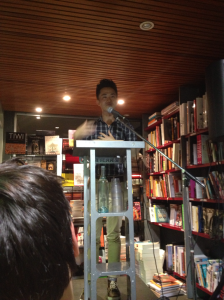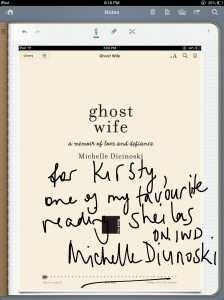 Ninety 9 by Vanessa Berry
Ninety 9 by Vanessa Berry
My rating: 3 of 5 stars
At the end of the nineties, I started a master’s thesis on zines, through which I first encountered Vanessa Berry’s work. Over the years of my research, I learned that her zines were enjoyed by many, and that, within the Australian zine subculture, she was, effectively, a celebrity: revered for her writing, her knowledge of various aspects of more obscure instances of popular culture, and her inventiveness and constant renewal of the zine form through various self-publications.
I enjoyed Berry’s self-publishing at the time, beyond my immediate academic concern with her work, generally, as the subject of my thesis. Rather than her subcultural insights into bands, however, I liked what might be considered the scholarly and literary aspects of her work: the research she’d done for her zine that reviewed all 69 St. Vincent de Paul op shops in Sydney; her description of her experiences of reading James Joyce’s Finnegan’s Wake amid the enforced languor of Chronic Fatigue Syndrome; her discipline in writing Laughter and the Sound of Teacups on the 23rd of every month; and, indeed, the aural evocativeness of that title.
I never actually met Berry while I was completing my thesis. I once saw her across the floor at an early National Young Writers’ Festival in Newcastle, surrounded by a posse of fellow zine makers and bloggers, but as one of the (fledgling) academics that she admits, in Ninety 9, she regarded with suspicion, I was never afforded the opportunity to talk to her in any depth. At the time, I worried enormously about not getting to talk with Berry, as a key figure in the zine subculture; could I say that I had done a comprehensive survey of zine publishing in Australia if I hadn’t spoken with her, gotten her approval for my project? I soon learned that a comprehensive survey of zine publishing wasn’t possible, but also, Berry (and those close to her) had relayed her thoughts and views on zines and her production of them in a range of media otherwise available to me so that I didn’t need to bother her after all.
I’m relaying the above concerns, because I don’t come to this book without a history, however tangential, with its author and subject matter. Perhaps this would otherwise be irrelevant to my reading, except that I sought this book out and began to read it on the eve of my submission of an article about zines commissioned by The Conversation in their ‘Explainer’ series. It had been a decade since I’d submitted my master’s, so I was concerned, not only that my knowledge wasn’t up-to-date, but that I also needed to say something about the trajectory of zine makers I had known or known of during my research. Not everyone whom I encountered during my thesis still makes zines, as Berry does. Indeed, it was of some interest to see Sunanda Creagh’s name on the staff of The Conversation–she too, along with her friend Lee, had been well-regarded zine publishers at the time. So, despite having reconciled the different perspectives on zine production between those of zine publishers and mine as a researcher, I still felt an involuntary twinge of inadequacy about explaining anything about zines all these years later.
***
In the end, Ninety 9, has only one chapter dedicated to zines, but the other chapters contain the substance of the topics that filled Berry’s zines throughout the nineties and into the new millennium: radio programs and mix tapes, bands and music festivals, magazines and T-shirts, cult television and literature, share houses and op shops. Throughout the memoir, a picture emerges of the importance of popular and literary culture in the formation of a young woman’s identity; both forms clearly offered Berry a sense of belonging not immediately available to her in suburban Sydney. What’s key, however, is that Berry’s coming of age memoir is not simply about the consumption of cultural artefacts, but is equally about the relationships she forged through sharing her pleasure in those forms through writing and publishing, through which she found like-minded people and, ultimately, her place in this world.
I found the final chapter, which recounts Berry’s discovery of an abandoned suitcase in the back streets of Petersham, to be a satisfying ending to this fin de siècle memoir. This found object that turns out to contain the papers of one of her contemporaries, which she sifts through to glean a sense of its owner, is offered as an analogy for Ninety 9: a loosely-shaped memoir formed through unadorned prose on layers of abandoned paper, mix tapes, and reconditioned band T-shirts. That said, however, we can be grateful to Giramondo for publishing Berry’s work in a more substantial form than a decaying suitcase, so that rather than disintegrating as ephemera is wont to do, it can serve as a memory, as a record, of a life, of a decade.




